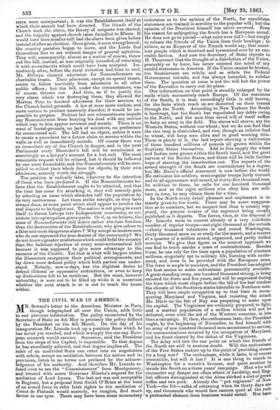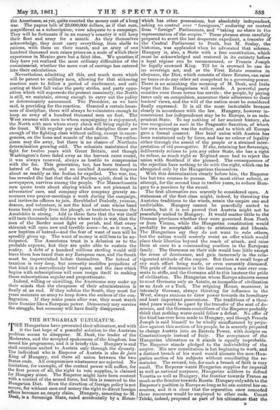THE CIVIL WAR IN AMERICA.
MR. Seward's letter to the American Minister in Paris, though telegraphed all over the Union, adds little to our previous information. The policy enunciated by the Secretary of State on 4th May is precisely the policy defined by the President on the 4th March. On the day of his inauguration Mr. Lincoln took up a position from which he has never yet receded, and which is simply the one any Euro- pean monarch would assume. Secession, said the President from the steps of the Capitol, is impossible. To that dogma he has steadfastly adhered, and that dogma implies all. The ruler of an undivided State can enter into no negotiation with rebels, accept no mediation between the nation and its provinces, listen to no terms not prefaced by the acknow- ledgment of his authority. And therefore Mr. Lincoln re- fused even to see the " Commissioners" from Montgomery, and treated with scorn Governor Hincks's request for the mediation of Lord Lyons. The last act was not acceptable in England, but a proposal from Smith O'Brien at the head of an armed force to refer Irish rights to the mediation of Count de Flahault would scarcely, we imagine, find much favour in our eyes. There may have been some momentary indecision as to the opinion of the North, for republiCan statesmen are trained in servility to the popular will; but the opinion of the President himself has never swerved. Even his reason for subjugating the South has a European sound. He does not go to punish—what ruler ever did?—but simply to release the friends of the Union from their bondage ; to relieve, as an Emperor of the French would say, that excel- lent people which is deceived and tyrannized over by an exe- crable faction. And now the Secretary of State repeats to M. Thouvenel that the thought of a dissolution of the Union, peaceably or by force, has never entered the mind of any candid statesman in America. If the Union cannot be broken, the Southerners are rebels, and as rebels the Federal Government intends, and has always intended, to subdue them. The question at issue is not the will but the power of the Executive to carry out its plans. Our information on that point is steadily enlarged by the mails which successively reach Europe. Of the resources of the South, it is true, exceedingly little is still known, for the facts which reach us are distorted on their transit through the North. According to New Yorkers the South is bankrupt, but the South has repudiated her debts owing to the North, and the sum thus saved will of itself suffice to keep an army in the field. The slaves will starve, say the Western States, without our wheat ; but we do not find that the rice crop is diminished, and rice, though an inferior food to wheat, will keep men alive and in good working trim. There is plenty of it, the last report showing a cultivation of three hundred millions of pounds all grown within the Southern States themselves. Add to this supply the wheat and Indian corn grown within the South itself, and the great harvest of the Border States, and there will be little further hope of starving the insurrection out. The reports of the armed strength of the South are contradictory to a degree, but Mr. Davis's official statement is now before the world. He estimates his soldiers, semi-regular troops fairly trained, and to all appearance well armed, at thirty-five thousand men. In addition to these, he calls for one hundred thousand more, and as the eight millions who obey him are mili- tary in tone, he may obtain them for a time.
In the North every detail pleasant and unpleasant is in- stantly given to the world. There may be some exaggera- tion as to numbers, but we suspect less than is usually sup- posed, the precise muster of the regiment being usually published as it departs. The forces, then, at the disposal of Mr. Lincoln seem to consist already of a very indefinite number of regular troops—not eight thousand at the outside —thirty thousand volunteers in and round Washington, thirty thousand more on or ready for the march, and a reserve of a quarter of a million armed, organized, and partly drilled recruits. We give that figure as the nearest approach we can find to truth amidst a mass of contradictions. Besides these, he can rely for the time upon a population of nineteen millions, singularly apt to military life, burning with excite- ment, and soon to be provided with the European arms. The force is ample in numbers, and the President has adopted the best means to make enthusiasm permanently available. A great standing army, one hundred thousand strong, is being enlisted for three and five years, and will be organize&during the time which must elapse before the fall of the leaf renders the climate of the Southern states tolerable to Northern men. They will have ample occupation up to that time in recon- quering Maryland and Virginia, and resisting the attack Mr. Davis on the 8th of May was preparing to make upon the capital. The Virginians are evidently prepared to fight, and a martial population of a million whites will not be defeated, even with the aid of the Western counties, in less than a campaign. If, then, the enthusiasm lasts, the President ought, by the beginning of November, to find himself with an army of one hundred thousand men accustomed to service, his communications secured by the occupation of Maryland, and his front cleared by the defeat of the Virginians. The delay will test the one point on which the friends of the North are still in anxious doubt. Will the enthusiasm of the Free States endure up to the point of providing means for a long war ? The enthusiasm, while it lasts, is of course irresistible, but will it last ? It is one thing to march to Washington for a month's bivouac, and quite another to invade the South on a three years' campaign. Men who will encounter any danger are often afraid of hardship, and Eng- lish officers distinguished at the Alma shirked a diet of green coffee and raw pork. Already the " pet regiment" of New York—the 7th—talks of returning when its thirty days are up, and thousands who would face cannon quail at the ruin a protracted absence from business would entail. Nor have the Americans, as yet, quite counted the money cod of a long war. The papers talk of 23,000,000 dollars, as if that sum, magnificent as a subscription, were adequate to a campaign. They will be fortunate if in an enemy's country it will keep their fleet and army for a month. As they themselves acknowledge, they must carry everything, from shells to rations, with them on their march, and an army of one hundred thousand men raises prices on a scale of which their experience in Mexico gave but a faint idea. We question if they have yet realized the most ordinary difficulties of the commissariat, whether the mere cost of carriage has entered into their calculations.
NeVerthelesi, admitting all this, paid much more which will be patent to military men, allowing for that sickening reaction sure to follow a period of excitement, and esti- mating at their full value the party strifes, and party oppo- sition which will supersede the present unanimity, the North is still, we maintain, strong enough to carry out the policy so determinately announced. The President, as we have said, is providing for the reaction. Granted a certain loose- ness of discipline, there will always be volunteers enough to keep an army of a hundred thousand men on foot. The West swarms with men to whom campaigning is enjoyment; the North with men whom every check will bring rapidly to the front. With regular pay and slack discipline there are enough of the fighting class without calling, except in emer- gencies, on the bone and muscle of the nation. The enthu- siasm may die away, but there is no change of Northern determination growing cold. The colonists maintained the fight for twelve years with Great Britain, and though Washington's force faded away as the harvest came round, it was always renewed, always as hostile to compromise with the foe. This generation, too, has been trained in hatred of the South, and an insulted American forgives about as readily as the Indian he expelled. The war, too, has revealed the fact that the old Puritan spirit, dead in the newspapers, survives among the people. The Massachusetts men quote texts about slaying which are not pleasant in adversaries' ears, and company after company gravely an- nounces two prayer-meetings a week during the campaign, and invites its officers to join. Zerubbabel Peabody, yeoman, deacon, and volunteer, is not the kind of man whose hand turns back readily from the plough, or hesitates because the Amalekite is strong. Add to these facts that the war itself will turn thousands into soldiers whose trade is wir, that the men of the Border must fight or perish; and that every skirmish will open new and terrible sores—be, as it were, a new baptiim of hatred—and the fear of want of men will be speedily given up. The want of money is still less to be an- ticipated. The Americans trust in a delusion as to the probable expense, but they are quite able to sustain the reality. A debt of a hundred millions sterling would still leave them less taxed than any European race, and the South must be impoverished before themselves. The hatred of taxation is very deep; but necessity modifies prejudices of that kind in a marvellously brief space, and the race which begins with subscriptions will soon resign itself to Making those subscriptions regular and proportionate.
Indeed, willing or unwilling, the Americans may make up their minds that the cheapness of their administration is finally at an end. If they subdue the South, they must for years maintain an army to keep down the embers of the con- flagration. If they make peace after war, they must *etch their frontier like a European power. Democracy may survive the struggle, but economy will have finally disappeared.































 Previous page
Previous page